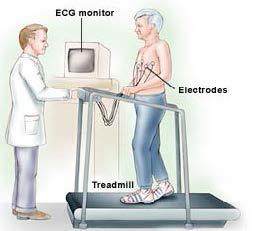An exercise stress test is used to measure the effect of exercise on your heart.
How to Prepare for the Test
Wear comfortable shoes and loose clothing to allow you to exercise. You may have to wear a gown for the upper body only.
Ask your health care provider if you should take any of your regular medicines on the day of the test as some medicines may interfere with test results. Never stop taking any medicine without first talking to your doctor. Tell your doctor if you are taking sildenafil citrate (Viagra), tadalafil (Cialis), or vardenafil (Levitra) and have taken a dose within the past 24 to 48 hours.
You must not eat, smoke, or drink beverages containing caffeine or alcohol for 3 hours (or more) before the test. In most cases, you will be asked to avoid caffeine for 24 hours before the test. This includes:
- Tea and coffee
- All sodas, even ones that are labeled caffeine-free
- Chocolates
- Certain pain relievers that contain caffeine
How the Test is Performed
The technician will place 10 small pads (electrodes) on your chest/upper body. These patches are attached to an ECG monitor that follows the electrical activity of your heart during the test.
You are then shown how to use the treadmill. You will need to exercise for several minutes. The exercise is very easy at first. Then it slowly gets harder. You should exercise for as long as possible.
Your heartbeat and blood pressure are monitored during and after the test.

The test will continue until:
- You reach a target heart rate.
- You develop chest pain or a change in your blood pressure that is concerning.
- ECG changes suggest that your heart muscle is not getting enough oxygen.
- You are too tired or have other symptoms, such as leg pain, that keep you from continuing.
You will be monitored for 10 - 15 minutes after exercising, or until your heart rate returns to baseline. The total time of the test is around 60 minutes.
Report Any Symptoms
Be sure to tell the doctor or tech if you feel any of the following during your test:
- Chest, arm or jaw discomfort
- Severe shortness of breath
- Fatigue
- Dizziness
- Leg cramps or soreness
After the Test
As soon as the test is over, you may eat and return to your normal routine. Ask your doctor about taking any medicine that you were told to skip before the test.
Why the Test is Performed
Reasons why an exercise stress test may be performed include:
- You are having chest pain (to check for coronary artery disease -- narrowing of the arteries that feed the heart muscle).
- Your angina is getting worse or is happening more often.
- You have had a heart attack.
- You have had angioplasty or heart bypass surgery.
- You are going to start an exercise program and you have heart disease or certain risk factors, such as diabetes.
- To identify heart rhythm changes that may occur during exercise.
- To further test for a heart valve problem (such as aortic valve or mitral valve stenosis).
There may be other reasons why your health care provider asks for this test.
Normal Results
The meaning of your test results depends on the reason for the test, your age, and your history of heart and other medical problems.
What Abnormal Results Mean
Abnormal results may be due to:
- Abnormal heart rhythms during exercise
- Changes in your ECG that may mean there is a blockage in the arteries that supply your heart (coronary artery disease)
When you have an abnormal exercise stress test, you may have other tests performed on your heart such as:
- Cardiac catheterization
- Nuclear stress test
- Stress echocardiography
Download the Exercise Stress Test Information sheet here.
Click here for more information.

